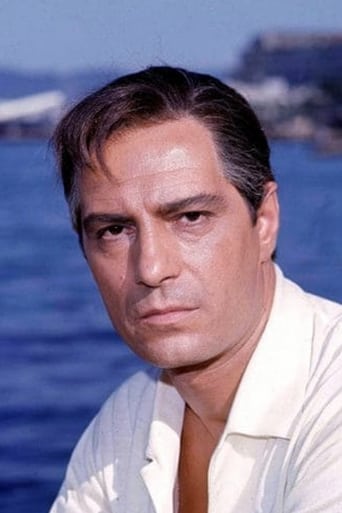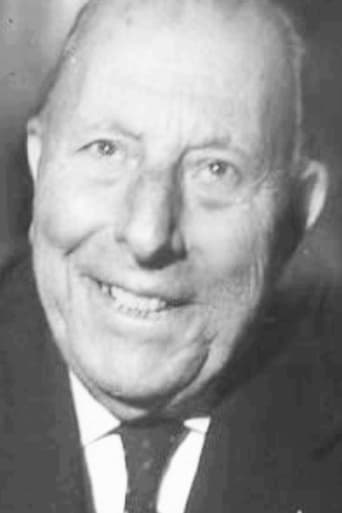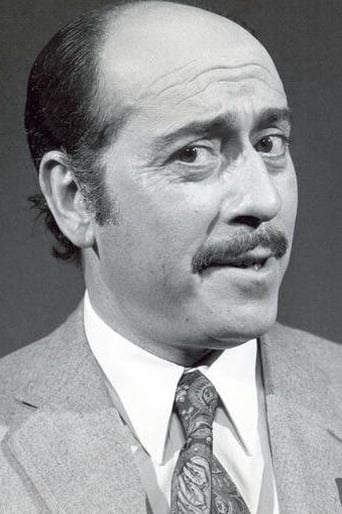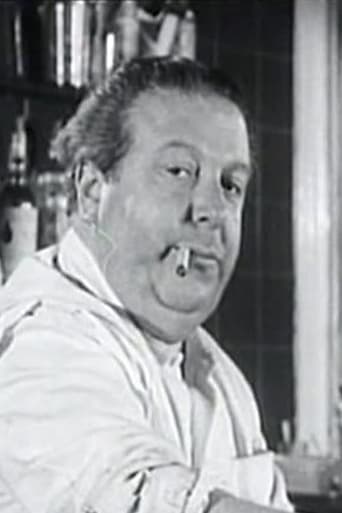GurlyIamBeach
Instant Favorite.
Majorthebys
Charming and brutal
Comwayon
A Disappointing Continuation
Scotty Burke
It is interesting even when nothing much happens, which is for most of its 3-hour running time. Read full review
framptonhollis
Fiercely funny and unapologetically black, "The Executioner" is among the most entertaining comedies that I have ever seen. Through morbid themes and distressing issues, this masterpiece of the macabre is one of Spanish cinema's many miracles. The pace is as fast as a speeding bullet as visionary filmmaker Luis Garcia Berlanga slyly mocks the heated controversy of capital punishment. Forcing its lead character to choose between traumatizing himself and living a life of poverty, Berlanga is masterfully able to turn transform tragedy into farce.While the constant comedy may seem to some as no more than silly distraction from the social commentary, I sensed not only a consistent sense of farcical satire in the masterwork, but also a consistent sense of dread and awareness. The film can be split into two halves: the first being a slightly morbid, but utterly charming romantic comedy, and the second being a much more bleak work of direful, tragicomic satire. Many satires have the unfortunate flaw of paying much more attention to their message than the quality of their script, characters, and plot; "The Executioner" shares all of these traits. Beyond the black and social critiques, there are some highly likable characters and a flat-out amazing premise, satirical or not.Chaotic, sad, and laugh-out-loud hilarious in equal measure, it is hard to determine whether "The Executioner" is a work that leaves an imprint of joy or sorrow. My reaction is one of both, for the ambiguous ending serves as both a punchline and a bone chilling reminder of the unpredictable tragedies hidden deep within the human experience.
Oslo Jargo (Bartok Kinski)
*** This review may contain spoilers ****Plot and ending analyzed* I remember when I first saw the Executioner, it was in Spain in 1965. I was working as a stuntman in Spaghetti Westerns. It's a peculiar film, I don't think of it as so much a straight out Comedy, but more of a Comedy of social interaction. Remember, the brutal dictator Francisco Franco was in power at the time, thus they had to be quite subtle. There are hilarious scenes throughout; I kept thinking to myself there's plenty of grumpy people about in it, which makes it quite commendable and hilarious because you find them in the real world. The type of people who tell you to move or get away from a desk in some store or office, or people who make rude comments for no reason.The Executioner starts out with two guys who work at the morgue, picking up a stiff at the local prison who's just been executed. They see the prison executioner, who is an old man and the young morgue guy wants to avoid him because of the stigma involved. The old man executioner forgets his workbag. Well, the young morgue guy turns in his workbag to his apartment home and meets up with his daughter. They eventually get together and have a baby and get married. In order for them to have a residential apartment, the young morgue guy has to sign up as a executioner to get state benefits, but he's reluctant since it creeps him out so much.Eventually the prison calls him up to perform, and there's the crux of the matter. At that time, prisoners were executed by means of a garrote. It's like a metal harness and used to strangle a person.I thought the ending deviated a bit from my own expectations, but still, it wasn't terribly off. The Executioner might put off some audience expectations because it is a garrulous film. It gets tedious at times, but still pulls in above average. I liked the little jokes and comments made by rude people in the film. I don't think it was really a critique of the death penalty in my estimation, but one may be able to look at it in that manner.If you like foreign films, it's definitely worth a watch. One note, the synchronicity of the audio and the actors' mouths doesn't match, I don't know if it was just made that way or dubbed later with inept equipment. The film was an Iberian and Italian co-production, so maybe they were speaking Italian.There's not many extras, just a few and a booklet.Also recommended: La caza (1966) Surcos (1951) Plácido (1961) Viridiana (1961) Calle Mayor (1956) Welcome Mr. Marshall! (1953) Ensayo de un Crimen (1955)
Henry Fields
Another lesson of Berlanga about how to criticize the society avoiding censorship. "El Verdugo" looks like a comedy, sounds like a comedy, tastes like a comedy... But it is actually a fierce critic of the death penalty. The final sequence of this movie is one of the most brilliant ever (you cannot tell who's the criminal and who's the executioner!!!).And what to say about the great José Isbert?? He was a character himself, with that voice, and that physique. I don't know if he was a genius, I just can say that there will never be another actor like him.Berlanga + Azcona: an unbeatable team.*My rate: 10/10
Hedgehog_Carnival
Like "Bienvenido Mr Marshall", this film earns its keep first of all by being wickedly funny, an achievement that once again depends partly on the director's gift for distilling his somewhat baleful observation of Spanish society into a series of deft, economical verbal and visual gags and tableaux, and partly on the talents of the unforgettable Jose Isbert, who plays, with variations, his inherited role as an apparently humourless old man to whom hilarious situations just casually adhere as he muddles through life. In "Mr Marshall" a sly rascal with a curiously intermittent hearing problem, here he acquires a touch of the wry reflectiveness of the old man whose profession condemns him to virtual social ostracism, who can invite his future son-in-law to "here, put your fingers into this light socket" with all the casual gentility of someone offering a top-up to a glass of sherry.Next to him, and reaching over from comedy towards understated tragedy, Nino Manfredi turns in a flawless performance as the young man who dreams of going to Germany to learn the trade of mechanic, but gets prodded and browbeaten into a hasty marriage, then into accepting the title and benefits of a job he hopes never to have to perform, and then... The way this progression is conveyed is masterly: while he's clearly (and fatally) manipulable (esp. by his wife), we are never for a moment allowed to dismiss, or laugh at, his character as a simpleton, even though we may laugh with uneasy recognition at his clumsy attempts at courtship (distilled in an EXT scene where he first cleans the dog-dirt from his shoe, then invites his beloved to dance, then gets shouted at for "using up someone else's music" and ends up having to provide the music himself by whistling). He is, we decide, a decent human being who mostly tries to stay out of trouble and do the right thing for himself, his wife and future offspring - the true guilt lies elsewhere. The obscure tragedy we see happening is of a man being gradually and remorselessly deprived of his values and self-respect before he's even had time to become fully aware of them or decide how important they are to him. The implied social criticism leading on from that (throttled back, as always, to get past the censors) is fairly obvious.Which leads us to those astonishing final scenes: the fairylit grotto in Palma de Mallorca where a largely tourist audience wait expectantly for some watery spectacle to occur, only to see a surreal tricorned Civil Guard drifting through in a boat and calling out to Manfredi's "Jose Luis Rodriguez" in a stentorian, megaphone-amplified "whisper"; then the scene in which we are offered a crane shot of an unfurnished prison yard with a door in the far corner, towards which we watch Jose Luis being hustled or dragged, weakly protesting, by a mixed contingent of priest and guards, very much as if he himself were the condemned prisoner. There's something so allusively haunting about that shot - whether it's the poignant detail of the dropped hat, whether the stuffing of a fat group of black-clothed people through a narrow door inspires Biblical reminiscences or suggests a birth in reverse - that it alone propels this film into some pretty select company in terms of artistic greatness. But, again like Mr Marshall, this film is so packed with visual and verbal gems that it would take a book, and several dozen viewings, to come anywhere near doing it justice.








